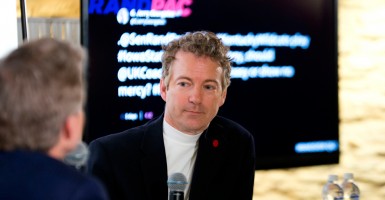Capping a weekend in Austin, Texas designed to advance his credibility with young techies, Sen. Rand Paul today opened what he describes as a “tech-oriented office” in Capital Factory, that city’s trendy technology incubator.
Paul’s Austin tech office, spokesman Sergio Gor said, “will center on digital engagement and product innovation.”
“I don’t want the government to be able to screw up one of the greatest marketplaces we have.”-@SenRandPaul
The office opening for RandPAC wrapped up the prospective presidential candidate’s high-profile presence at the “interactive” portion of the sprawling 2015 South by Southwest (SXSW) Music, Film and Interactive Festival.
Paul, R-Ky, and his staff produced a steady stream of Twitter, Facebook and other social media posts during his visit to South by Southwest.
They trumpeted his participation in a Twitter town hall last night moderated by state Sen. Don Huffines, R-Dallas, and an earlier interview with Evan Smith, editor-in-chief and CEO of the Texas Tribune (see takeaways below).
“I think they’re going to make me work in the [Capital Factory] office,” Paul quipped to Smith.
Thanks to everyone who came out to my tech office opening today in Austin! #SXSW pic.twitter.com/oUgqoMUBAt
— Senator Rand Paul (@SenRandPaul) March 16, 2015
The South by Southwest Interactive Festival, or SXSW Interactive, centers on emerging technology and has garnered a reputation as “a breeding ground for new ideas and creative technologies” such as Twitter and Foursquare.
“You can be a pot-smoking Austinite and believe…that gov’t oughta leave you alone.”-@SenRandPaul
Paul, who grew up in Lake Jackson, Texas, as the middle son of former Rep. Ron Paul, spoke yesterday morning at the launch event for Liberty Action Texas. The new group describes its mission as drawing more young conservatives and libertarians into politics—a goal Paul shares.
“You can be liberal, you can be conservative, you can be an evangelical Christian, you can be a pot-smoking Austinite and still believe in freedom and that the government oughta leave you alone,” Paul said to attendees.
@SenRandPaul speaking at the #libertyaction launch event in #SXSW! #txlege.#randsxsw pic.twitter.com/OqEBjcEYxC
— Vinny Kalkofen (@vkalkofen) March 15, 2015
Paul’s aggressive move aside, tech applications to the modern campaign are not being ignored by other likely Republican candidates for president such as Sen. Marco Rubio of Florida, Sen. Ted Cruz of Texas, Wisconsin Gov. Scott Walker or former Florida Gov. Jeb Bush.
But the Kentucky Republican clearly intends the Austin office to be the nucleus of tech-driven efforts to lure voters to his side. A press release quotes Vincent Harris, Paul’s senior digital strategist, as saying:
This will be a crowd-sourced campaign that places an emphasis on creativity and innovation. Austin is known as ‘Silicon Hills’ for a reason, and we will welcome anyone interested in working with our team.
.@SCpundit I'm a constitutional conservative. Libertarianish. Have a foot in both camps. #randsxsw
— Senator Rand Paul (@SenRandPaul) March 15, 2015
In a blog post, Capital Factory chief Joshua Baer countered any questions by saying Paul’s tech team would not be “campaigning” from the office there but working on “a technology project for the campaign.”
“There won’t be Rand Paul signs around Capital Factory or anything,” Baer wrote. “If in practice it doesn’t work the way we’re hoping, then we will make a change.”
Capital Factory fancies itself “the center of gravity for tech startups and entrepreneurs in Austin.” It’s a bustling meeting place, education center and “co-working” environment for entrepreneurs, programmers and designers.
I'm excited to be opening my tech office in Austin today! #SXSW pic.twitter.com/UDIzuEZTc8
— Senator Rand Paul (@SenRandPaul) March 16, 2015
Paul apparently has no problem with the word “campaign” popping up in the announcement of his office opening. (He contended during the Twitter event, however, that he means “…for Senate.”)
Two staffers expected to be regulars there are Harris and Rachel Kania, newly hired as Paul’s senior field and technology strategist. Like Harris, Kania didn’t shy from using the C-word in the press release:
Team Rand will be the most technologically savvy campaign in the field and his message will inspire and widen the GOP base unlike any other candidate.
Kania and Harris both previously worked for Cruz, Paul’s Senate colleague from Texas who also is pondering a race for president. Kania was Cruz’s statewide field director for his upset primary victory in 2012. Harris oversaw digital strategy for that campaign.
.@James3940 if we had an executive who was motivated to save $, we could save a lot through the executive branch. #randsxsw
— Senator Rand Paul (@SenRandPaul) March 15, 2015
For interviews yesterday, Paul dressed tech-formal in a sports jacket over a collarless white shirt, jeans and cowboy boots.
Here are some (mostly) tech-related takeaways of his live-streamed sit-down last evening with the Texas Tribune’s Smith at the JW Marriott:
He’ll probably announce his presidential intentions in April. In the next few weeks he’ll gauge whether his message has gained “traction,” Paul said, adding that wife Kelley remains “a work in progress” on the idea.
He inadvertently bared his interviewer’s ignorance about one of President Obama’s most-publicized pop culture strategies. Paul drew a complete blank from Smith when he said in today’s media environment a president has to speak with both the Texas Tribune and “that girl in the bathtub.”
“Tech is important, but so’s substance.”-@SenRandPaul at SXSW Interactive
The reference Smith didn’t get was to video star GloZell Green, who scored a post-State of the Union interview with Obama that drove traditionalists to distraction. “You’re not up to date,” Paul chided, though he couldn’t bring Green’s name to mind.
He isn’t going to dish on specific tech tactics. “Tech is important, but so’s substance,” Paul said. His team intends to use tools to identify voters who “might be coming our way” because they are “free thinkers,” “part of the leave-me-alone coalition” that doesn’t want government to tell them what to do.
Looking at voters’ digital “footprints” will help determine not only what an ad says but where it appears online, he said. Later, Paul allowed that he uses Snapchat because it reaches a primarily young audience. “We’re trying to get new people engaged,” he said. “You have to find people where they are.”
— Senator Rand Paul (@SenRandPaul) March 15, 2015
Hillary Clinton’s email routine is revealing. By using a private email account and a private server when she was secretary of state, Clinton exposed sensitive and even classified material to cyberattack, Paul said, and she was “crazy” to think physical protection of the server was adequate.
The applicable email use policy “should be the same for everyone” in a particular agency, he said. “The Clintons kind of think the law is, like, for you ordinary people [but] the law can’t be different for different people.”
Race no longer is a significant barrier to voting; a felony conviction is. The nation is “doing a lot better” in matters of race than 50 years ago, Paul said, adding: “It’s foolish of us to say, ‘Oh, there’s a horrendous problem.’ … The biggest thing that disenfranchises people in this country is the war on drugs.”
Paul drew applause by touting legislation he co-sponsored with Senate Minority Leader Harry Reid, D-Nev., to allow nonviolent felons to regain the right to vote. Democrats who question his commitment to extending the Voting Rights Act, he said, are making “a partisan attack.”
“I’m not against the NSA. I just think they should obey the Bill of Rights.”-@SenRandPaul
His stand against government invasions of privacy will attract young voters. “I’m the only candidate saying bulk collection of your phone records should be shut down,” Paul said early on, to applause. “This bulk collection … goes against everything this president ran on. … He has shown much less regard for privacy than the Republicans did before him.”
Asked specifically whether Obama was worse than President George W. Bush in this regard, Paul replied, “Without question.” He added: “I’m not against the NSA. I just think they should obey the Bill of Rights.”
Great to see @WillHurd at the Pandora event at #sxsw pic.twitter.com/wFrRvTLRp4
— Senator Rand Paul (@SenRandPaul) March 15, 2015
Obama gave Republicans such as himself an opening to non-white voters. Besides greater respect for constitutional rights, Paul said, his plans to cut taxes, create jobs and expand school choice would be more effective in extending opportunity—particularly in distressed areas such as Detroit.
“I don’t fault him for not caring or not having motivation,” Paul said of Obama. “But I think there’s objective evidence that nothing has really happened to fix the problem off black unemployment.” Increasingly, he added, black leaders are willing to say “we’re going to listen [to a Republican] because we want people to compete for our vote.”
Imposing so-called “Net Neutrality” is like forbidding the Postal Service to charge more for faster service. Or not allowing bigger customers to negotiate a better wholesale price. “The Internet is so free of regulations; we ought to keep it that way,” Paul said. “I don’t want the government to be able to screw up one of the greatest marketplaces we have.” The solution, he said, is to encourage competition and break up monopolies.
If he were president, dozens of senators wouldn’t feel compelled to write a foreign government about the role of Congress. “I would run things in a different way,” Paul said, insisting that while he tries to be friendly and respectful to Obama, the president’s “stiff arm” aloofness from members of the House and Senate came back to bite him.
“There is no one in Washington more against war and for a negotiated deal [with Iran] than I am,” Paul said. “I would be bringing people like me to the White House to say this is what we’re doing in the Iran negotiations and we want to include you.”
Obama’s sharp run-ins with lawmakers over immigration, health care and military action overseas have the same root, he said: “It’s his misunderstanding of the separation of powers that gets us into conflict. … We won’t be bullied.”




























